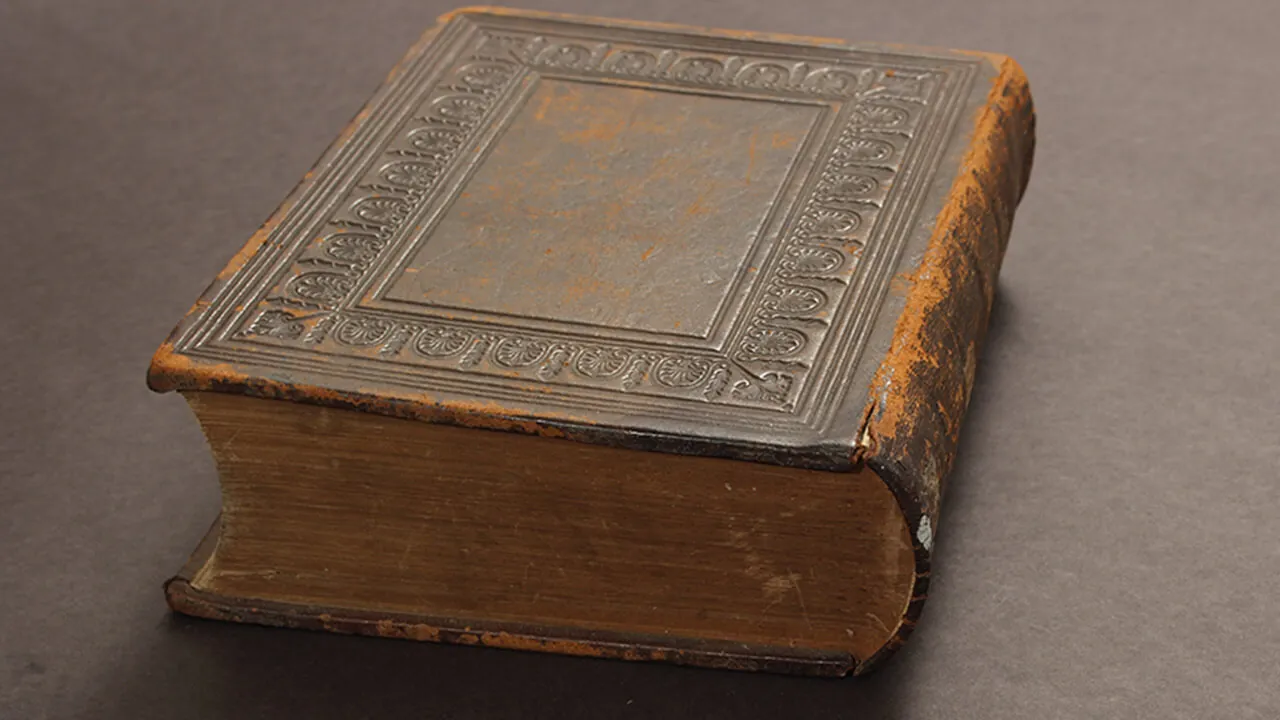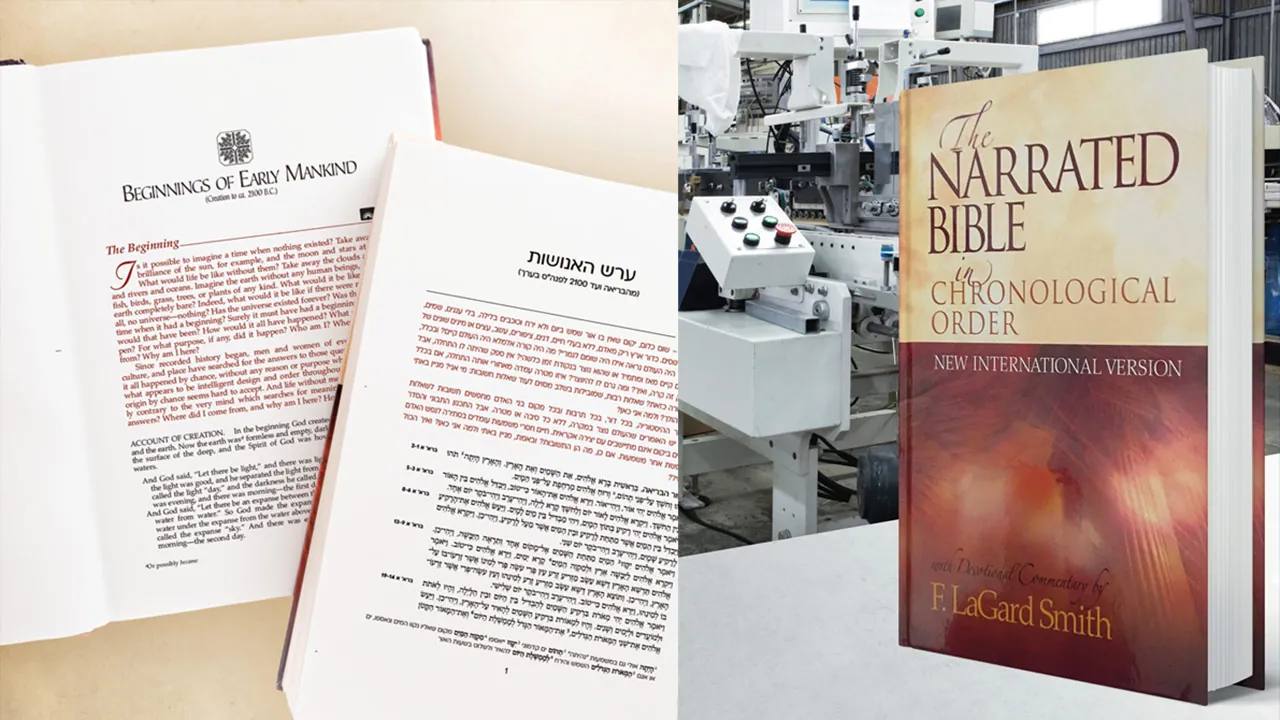
Part 5 of the Word of God Series
- More Articles in this Series:
- Part 1: The Power of God’s Word
- Part 2: The Rise and Fall of the Word of God
- Part 3: When the Word of God Ceased to Exist
- Part 4: The Bloody Battle to Liberate the Word of God
The Dark Ages hung over Europe for close to a thousand years. Most humans existed as slaves under another name. Eighty to ninety percent of Europe’s population were serfs who worked for their masters or “Lords,” growing their food, raising their livestock, milling their grain and spinning their thread. They and their Lords lived in virtually self-contained economic manors.
After their forced-labor duties were done, the peasants and their serf-born children then paid a hefty fee in exchange for using a piece of their master’s land to eke out a few crops for their own survival. They could never leave their manor. They were completely illiterate, though their Lord and his children probably had some education.
The Crusades had come and gone. The Popes had called for their mighty hordes of Crusaders to defeat the Muslims. Instead, they viciously slaughtered Jews and other minor Christian sects while failing to oust the Muslims.
Of course, Crusaders did learn and advance from their contact with the Muslims–like the numeric system (1, 2, 3, 4), science, astronomy and even ship building, which added value to the wealthy and powerful of Europe.
But Europe’s knowledge of God as written in the Bible had hit bottom. The religion they knew was to pray to Mary and the Saints and to pay money to the local priest to have their sins forgiven (indulgences). A personal relationship with their Savior, Jesus Christ, was forgotten, long ago, by the Catholic church.

The Black Death
Then the Bubonic Plague brought change to Europe that transformed it forever. In 1346, diseased fleas, riding on rats aboard ships, began to kill sailors. Wherever these ships docked and transferred goods onto horses, the fleas and the infected rats rode with them. The plague hit the entire continent. Twenty-two days after exposure, masses of people would die.
The living dug deep pits which, within a day would be filled. The latest researchers say that within seven years, 50 million Europeans died–60% of Europe. This is a truly mind-boggling statistic. Of course, no one knew what was causing the plague. Jews were accused of poisoning the wells, and thousands of them were burned at the stake by their countrymen.
What good could have come from the Black Death? Inevitably it had an enormous impact on European society and greatly affected the development of western civilization. So many serfs (and their masters) died that the entire economic order of western civilization was disrupted. There were no longer enough workers to till the land. Property changed hands. Many peasants, for the first time in centuries, began moving around, finding work with better conditions. Wages rose. Some were able to buy land for themselves or begin small businesses. The European economy began to flourish and expand.

Yet Another Catastrophe
Still another disaster: the Byzantine Empire imploded from inside–as empires tend to do because of civil wars and struggles by their own greed-driven rulers. In 1453 a weakened Constantinople was overrun by the Ottoman Turks and ended its 1000-year reign. Again, what good could have come out of this Muslim victory over the remnants of a Christian empire?
Through many hundreds of years in western Christian countries, the only Bible available was the Latin-language Vulgate Bible–completely corrupted with mixed Catholic doctrine interlaced among the chapters. Western scholars had simply lost knowledge of both Hebrew and Greek–the original languages of the Bible.
Incredibly, even the fall of the Byzantine empire in 1453 helped fuel a budding Renaissance of education which would rediscover classical philosophy, literature and art. Yes, the Renaissance was primarily a cultural movement which promoted humanism, but it also helped lay the foundation for the Protestant Reformation.
No one could have written a script that foresaw what was about to happen. In the Byzantine empire, Greek was still widely spoken, and students received education in Greek history and literature. There was also some Hebrew language scholarship, mainly among Jews. When the Ottoman Turks captured Constantinople, Greek scholars fled and brought their knowledge to Europe. Both Greek and Hebrew were resurrected by European scholars’ growing interest in these ancient languages. And the printing press had just been invented which would spread education throughout western Europe.

Martin Luther 1483 – 1546
Just at this auspicious moment in time, a man appeared on the horizon who radically reshaped Germany’s religion, language and culture. In fact, the entire western civilization would be fundamentally transformed. Ordained a priest in 1507, Martin Luther became a German professor of theology, composer, priest and a monk–and a reformer. Like the Czech martyr John Hus, he especially despised the practice of indulgences to pay one’s way out of hell.
As he studied the Bible, he came to the conclusion that salvation and eternal life are not earned by good deeds but are a free gift of God’s grace through faith in Jesus Christ as redeemer from sin. He challenged the Popes’ authority by teaching that the Bible is the only source of divinely-revealed knowledge.
Luther’s goal was to equip every German-speaking Christian with the ability to read or hear the Word of God, and his translation of the Old and New Testaments from Hebrew and Greek into the vernacular by 1534 actually launched the Reformation.
His translation of the Bible into German had a tremendous impact on German culture. Besides challenging the Roman Catholic Church, it helped standardize the German language itself. His hymns influenced the development of singing in Protestant churches. His marriage to Katharina von Bora, a former nun, set a model for the practice of clerical marriage, allowing Protestant clergy to marry.
His Ninety-five Theses, which he posted on the door of All Saints’ Church in 1517, sparked the Protestant Reformation. The Catholic Church was ever after divided, and the Protestantism that soon emerged was shaped by Luther’s ideas. His writings changed the course of religious and cultural history in the West.1

People Learn To Read
His New Testament was spread so quickly by printers that even tailors and shoemakers, yes, even women and ignorant persons who had accepted this new Lutheran gospel, and could read a little German, studied it with the greatest avidity as the fountain of all truth!
Though declared a heretic and his articles burned by the Church, he escaped execution because of his popularity with the common people. He was “kidnapped” by a local ruler and whisked away to be hidden in a castle. It was there he began work on translating the entire Bible. In all, it took him ten years to finish his translation from Hebrew and Greek.
The precedent he set was followed by other scholars, whose work made the Bible widely available in the vernacular and contributed significantly to the development of national languages.2
However, in his later years, he seemed to become a bitter old man. His rage against Jews is an inerasable evil stain on his life and his accomplishments. His life is a warning to all of us that although a person can be mightily used by God to change a nation, hatred and rage, as was found in Luther, defiled an entire people and poisoned Christianity until Hitler found succor in Luther’s writings. Nevertheless, it must be added: there had been a toxic malignancy of anti-Semitism throughout all the generations of the Roman Catholic Church. Though Luther was able to break away from much of the corruption of the Catholic Church, he was not able to shed this great sin.

William Tyndale 1494 – 1536
The English Reformation was more bloody than that of Germany. After John Wycliffe translated the Bible into English near the end of the 1300’s, the Roman Catholic Church declared the death penalty for anyone found with an English Bible.
William Tyndale was studying at Oxford and Cambridge Universities where Wycliffe had also attended a hundred years earlier. For those working on a degree in theology, their textbook was the Latin Vulgate Bible, as no other language was allowed.
But the halls of Cambridge were already flooded with Luther’s ideas. Tyndale loudly complained,
“They have decided that no man shall look at scripture, until he is nursed by heathen learning for eight or nine years and armed with false principles, which clean shut him out of the understanding of scripture.”
Now William Tyndale’s burning desire was to make the Bible available to all the common people of England. Shocked at the lack of elementary knowledge of the Bible among even the clergy, he told one priest,
“I defy the pope and all his laws,” replied William, “and if God spares my life, before many years pass I will help the boy who drives a plow to know more of the scriptures than you do!”
He went to London to ask the Bishop if he could be authorized to make an English translation of the Bible. The answer was no! So he left for Germany. He knew, of course, that John Wycliffe had created such a translation many years before, but his version was hand-copied, inaccurate, and very hard to find. Furthermore, it was translated from the Latin Vulgate, not from the original Hebrew and Greek.
Risking His Life
In Hamburg he worked on an English translation of the New Testament, and in Cologne, he found a printer who would dare to print his work. However, news of Tyndale’s New Testament got out and the press was raided. Tyndale escaped with the pages already printed and found a publisher in the city of Worms. Six thousand copies were printed and smuggled into England. The archbishop of Canterbury bought up copies from a friend of Tyndale, and destroyed them. The friend then gave the money to Tyndale which he used to print improved editions!
Tyndale had every reason to fear the Church’s wrath. Only a few years before, six men and a woman were burned to death for teaching their children the Lord’s Prayer and a few other verses in English, rather than Latin. But Tyndale began translation of the Old Testament as he hid among the merchants in Antwerp while Henry VIII, the Pope and the Holy Roman Emperor were searching all over England and Europe for him.

A True Genius
He worked directly from the original Hebrew and Greek while comparing his work to the Latin Vulgate and Luther’s recent German translation. He had learned Hebrew from rabbis he studied under in Germany. As for the Greek, he essentially taught himself! The style of his translation was simple and beautiful, words suitable for the common people. The British Telegraph newspaper recently wrote that his genius matched that of Shakespeare.
In the beginnynge was the worde, and the worde was with God: and the worde was God. John 1:1
He was finally betrayed by an Englishman who pretended to be his friend, but then turned him over to the authorities. He was brought to trial for heresy–for believing, among other things, in the forgiveness of sins and that the mercy offered in the gospel was enough for salvation. Some of the many charges were:
- He maintains that faith alone justifies.
- He denies that there is any purgatory.
- He affirms that neither the Virgin nor the saints should be invoked by us.
In 1536 he was condemned, and soon after was strangled and his body burned at the stake. The Foxe Book of Martyrsrelates, “William said nothing for some time, then uttered a few final words: ‘Lord, open the King of England’s eyes.’”

God Hears The Cries Of Martyrs
Amazingly, that same year King Henry VIII made a complete U-turn and declared it legal to translate the Bible into English. He announced the power of the Roman Catholic Church would now be his. Two years later, he required every church in England to make a copy of the English Bible available to its parishioners!
To meet this demand, an English ‘Great Bible’ (so-called because of its size) was put into production. It was based on William Tyndale’s illegally translated version–as much as he was able to do before his death–and finished by Miles Coverdale in 1535. It was the first Bible to be printed in English from the original languages. Immediately, 9,000 Bibles were distributed around England at the command of the Crown.

Back To Catholicism
But when King Henry VIII’s daughter, Mary Tudor, became queen in 1553, she was determined to return England back to the Roman Catholic religion. She burned at the stake 280 Protestant opponents including John Rogers, the publisher of the Great Bible. Fortunately her damage was limited to a reign of five years, and her hopes for a Catholic England died with her.
In 1604, King James I, son of Mary Queen of Scots, commissioned 47 scholars to produce the King James Bible. It was published in 1611. One estimate suggests that the New Testament in the King James Version is 83% Tyndale’s and the Old Testament 76%. In 2002, William Tyndale was placed at number 26 in the BBC’s poll of the 100 Greatest Britons. And the King James Bible today remains the most popular book of all time.
1 http://b.link/martin-luther
2 http://b.link/martin-luther-2
Next month: Where is the Bible going in our generation?
Today, the only version of The Bible that most people in Israel have access to is in ancient Hebrew, which is extremely hard for them to understand. Imagine if your only copy of this life-changing book was written in old Shakespearean English. Maoz Israel is on a mission to bring the Bible to Israel in modern Hebrew, and you can help make this possible when you make a donation.

Happy Passover!

What is a Promised Land?

The Scariest Parable in the Bible

Restoration of Our Land

What Makes this Hebrew Bible Different From All Others?

Two Miracles and a Message

Narrating Hope

Hope in Action

Fight to the Finish


